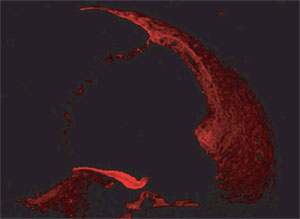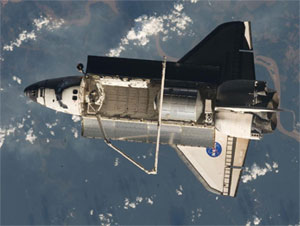|
Professor: Shin-ichi Usami
Associate Professor: Yutaka Takumi
Senior Assistant Professor: Kazuyuki Kainuma
Assistant Professor: Hideaki Moteki, Ryosuke Kito, Tomohiro Oguchi, Hisakuni Fukuoka
|
 |
Summary of Activity
Until recently, the causes of sensorineural hearing impairment were largely unknown. Our department has identified many genetic regions responsible for sensorineural hearing impairment in Japanese patients and incorporated those research findings into the clinical genetic testing for hearing impairment. We received designation to do such genetic testing as an advanced medical treatment by the Ministry of Health, Labor and Welfare of Japan.
We also research the genetic diagnosis of head and neck tumors in order to clarify the differences between tumor types and are engaged in space medicine research looking for solutions to space motion sickness.
|
Research Projects
GENETIC ANALYSIS OF HEARING IMPAIRMENT
Until recently, the causes of sensorineural hearing impairment were largely unknown. In the last several years, rapid advancements in the field of genetics have enabled us to identify genetic regions responsible for this condition. Our department has been engaged in genetic analysis of hearing impairment and has made several discoveries from a genetic approach. We also analyze the molecular mechanisms of hearing impairment by various molecular biological approaches. We feedback the research findings to clinical genetic testing for hearing impairment. Our genetic testing was permitted as an advanced medical treatment by the Ministry of Health, Labor and Welfare of Japan.

SPACE MEDICINE
As the 21st century began, the research and development related to the International Space Station accelerated at a rapid pace. In a weightlessness environment, accelerations of the body are changed, resulting in an acceleration information (centrifugal force) change received by the vestibular end organs of the inner ear. This is thought to be one of the causes of space motion sickness. A proposal made by our department was accepted as an International Life Science Experiment by NASA and our project was on board the Columbia Space Shuttle flight in 2003. Tragically the craft and all seven crew members were lost in an accident shortly before landing. In 2009-2010, we joined space shuttle missions as sample share research members for genetic analysis of the effect of microgravity environment on the vestibular system. We will use DNA chip technology to analyze on a cellular level the changes in neurotransmission in the vestibular system brought about by exposure to microgravity. Through analysis of the gene expression, this molecular biology project will contribute to the elucidation of the causes of space motion sickness and the mechanism of how the body adapts to different environments.

|
|
- Usami S, Moteki H, Suzuki N, Fukuoka H, Miyagawa M, Nishio S, Takumi Y, Iwasaki S, Jolly C. (2010) Achievement of hearing preservation in the presence of an electrode covering the residual hearing region, Acta Otolaryngol (in press)
- Usami S, Miyagawa M, Suzuki N, Moteki H, Nishio S, Takumi Y, Iwasaki S. (2010) Genetic background of candidates for EAS (Electric-Acoustic Stimulation), Audiological Medicine 8: 28–32
- Tsukada K, Nishio S, Usami S; the Deafness Gene Study Consortium. (2010) A large cohort study of GJB2 mutations in Japanese hearing loss patients. Clin Genet.
- Lu SY, Nishio S, Tsukada K, Oguchi T, Kobayashi K, Abe S, Usami S. (2009) Factors that affect hearing level in individuals with the mitochondrial 1555A.G mutation. Clin Genet. 75: 480-484.
PMID: 19475720 [PubMed - indexed for MEDLINE]
Related citationsRemove from clipboard
- Fukuoka H, Tsukada K, Miyagawa M, Oguchi T, Takumi Y, Sugiura M, Ueda H, Kadoya M, Usami S. Semi-quantitative evaluation of endolymphatic hydrops by bilateral intratympanic gadolinium-based contrast agent (GBCA) administration with MRI for Meniere's disease. Acta Otolaryngol. 130: 10-16.
- Miyagawa M, Fukuoka H, Tsukada K, Oguchi T, Takumi Y, Sugiura M, Ueda H, Kadoya M, Usami SI. (2009) Endolymphatic hydrops and therapeutic effects are visualized in 'atypical' Meniere's disease. Acta Otolaryngol. 13: 1-4.
- Usami S, Takumi Y, Suzuki N, Oguchi T, Oshima A, Suzuki H, Kitoh R, Abe S, Sasaki A, Matsubara A. (2008) The localization of proteins encoded by CRYM, KIAA1199, UBA52, COL9A3, and COL9A1, genes highly expressed in the cochlea. Neuroscience. 154: 22-28.
- Oshima A, Jaijo T, Aller E, Millan JM, Carney C, Usami S, Moller C, Kimberling WJ. (2008) Mutation profile of the CDH23 gene in 56 probands with Usher syndrome type I.
Hum Mutat. 29: E37-46.
- Usami S, Wagatsuma M, Fukuoka H, Suzuki H, Tsukada K, Nishio S, Takumi Y, Abe S. (2008) The responsible genes in Japanese deafness patients and clinical application using Invader assay. Acta Otolaryngol. 128: 446-454.
- Abe S, Yamaguchi T, Usami S. (2007) Application of deafness diagnostic screening panel based on deafness mutation/gene database using invader assay. Genet Test. 11: 333-340.
- Fukuoka H, Kanda Y, Ohta S, Usami S. (2007) Mutations in the WFS1 gene are a frequent cause of autosomal dominant nonsyndromic low-frequency hearing loss in Japanese. J Hum Genet. 52: 510-515.
|
|